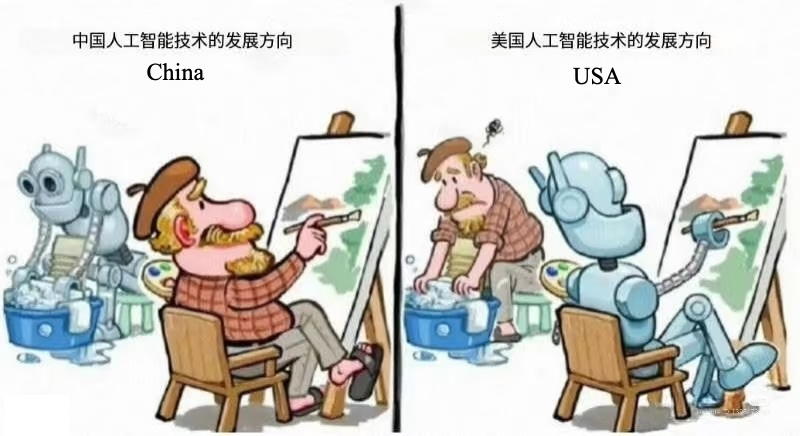Views: 41
The immense cultural differences between China and the West make the discussion about the technology competition pointless.
Peter Peverelli • 15 july 2025

Culture
What most Westerners fail to understand is that the relationship between abstract academic insight and practical applications varies across cultures. In order to properly understand the origins and meaning of the discussions about who is ahead in what area, cultural and social differences between China and the Western bloc must first be made clear. Fortunately, I can refer to previous articles on Chinasquare.
Particularism
On the cultural dimension universalism-particularism, China is far on the particularistic end. Applied to the subject matter of this article, this explains why new technology is put into practice much faster in China, while we prefer to work out the theory in great depth first. Universalists want to find out exactly how things are first; emphasis on theoretical insight. Then the theory is carefully tested in practice according to fixed protocols. Only at the end of that cycle does work begin on concrete practical applications for the general public. The particularistic Chinese also start with research, but as soon as some insight seems to emerge, they immediately get ideas about possible applications. If you have ideas, why not try them out right away? Before you forget them again?
Publications
Western universalists measure progress in an academic field primarily by the number of articles in leading journals. Lists of journals with a high impact factor (IF) have already been compiled. I have not seen any hard statistics so far, but those who claim that the US is still ahead in areas such as AI and quantum technology rely on a larger number of publications with a high IF. The articles on these areas that have appeared on Chinasquare so far mainly report on advances in practical applications. So they are not about quantum physics, but about quantum computers, quantum communication, quantum radar, etc.
Theory from practice
While thinking up and developing all these practical applications, Chinese specialists are constantly gathering bits of new theoretical insight in the relevant field. Every now and then they sit down to develop all these unorganized bits of new insight into a whole of broader and deeper theoretical insight. Every now and then that is enough to process into an academic article. In China, theory comes from practice.
Benefit for the general public
It is mainly ordinary citizens who benefit from this state of affairs. Chinese people can, for example, buy a large number of practical devices for use in and around the house in which AI is incorporated at a Xiaomi branch. These devices not only display intelligent behavior, but can often also communicate with their user and with each other.
Communitarianism
Another difference is that Western researchers want to protect their individual findings against theft by colleagues. Patents are a personal success for them. This also applies if the intellectual property of an invention belongs to the university or other institution where the researcher works. The Chinese system of applying for, granting and using patent rights is the same as ours. However, the interpretation and implementation is strongly influenced by another cultural dimension: individualistic – communitarian. The strongly communitarian Chinese are much more inclined to share new insights with colleagues than individualistic Westerners. This applies even more to peers from the same university, etc., who are often constantly connected to each other via social networks.
Diffuse
The third cultural dimension is specific – diffuse. Westerners usually identify with a specific context. Your current research team at the institute where you are currently conducting research is such a context. Other researchers working elsewhere are primarily competitors. Chinese social networks are diffuse. They are broader and deeper. An AI researcher from Tsinghua University feels connected to a colleague from a university in Shanghai. There is a good chance that they know each other personally. This also applies to the leaders of the relevant faculties.
Socialism
These cultural differences also affect the way in which the various governments operate. In previous articles on Chinese socialism I have already explained that the Chinese term ‘socialism with Chinese characteristics’ is in fact the same as ‘socialism embedded in Chinese culture’. This means that Chinese socialism is also particularistic, communal and diffuse. And it goes on: we can conclude that the enormous progress of China in recent years is due to the good connection between Chinese cultural values and socialism. Socialism was born as a Western ideology, but appears to thrive very well in the Chinese cultural context. An important characteristic of socialism is the visible hand of the government as the advocate of the entire people. Applied to the subject of this article, we see that the governments in question play an important role in bringing together research teams in various parts of China that are doing research in the same field. This applies to all academic research, but especially for strategically important areas such as AI and quantum physics, China is in fact one big research team. This is the engine of their enormous drive for innovation.
Futile
Now that we have made this clear, we can return to the question of who is ahead in, for example, quantum technology. However, I do not base my answer primarily on the above. In my opinion, this question is of no value whatsoever. It is not possible to determine who is ahead in a specific area at a specific time, because researchers do not report their findings on a daily basis. The answer is therefore determined on the basis of media publications. The media are usually biased. Editors of Western newspapers are hesitant to publish positive reports about China. They simply do not report on it. The audience at my lectures is usually not happy with the idea that China is ahead in any technical area. Then you get comments with a sour face that the US is ahead. It is more correct to say that Chinese research is at a world level in most academic and technological areas. This automatically means that every now and then a Chinese research team is ahead and then quickly falls behind again. That is the only real reality. If we focus on concrete applications, China is more often in the lead, because Chinese researchers are so practice-oriented. Then you can conclude that Chinese citizens benefit more and faster from technological innovations than we do in our world. However, that is not entirely true either. Western citizens also benefit from Chinese innovations; witness all the electronic gadgets with the inscription: made in China. Instead of investing so much energy in trying to stay ahead of China, we would do better to work openly with Chinese researchers and thus help the whole of humanity to progress. Hopefully we will experience that again.
Source: own research by the author
Thanks for reading! We’d love to hear what you think. Share your comments below and join the conversation with our community!
This article was first published on Chinasquare on 04.07.2025
Dit artikel in het Nederlands: Loopt China voor? Een futiele discussie.



As someone with graduate training in anthropology and an understanding of the role of cultural beliefs and values, I think your explanation of Chinese socialism clarifies it in a way that many other analysts of the subject have not done.